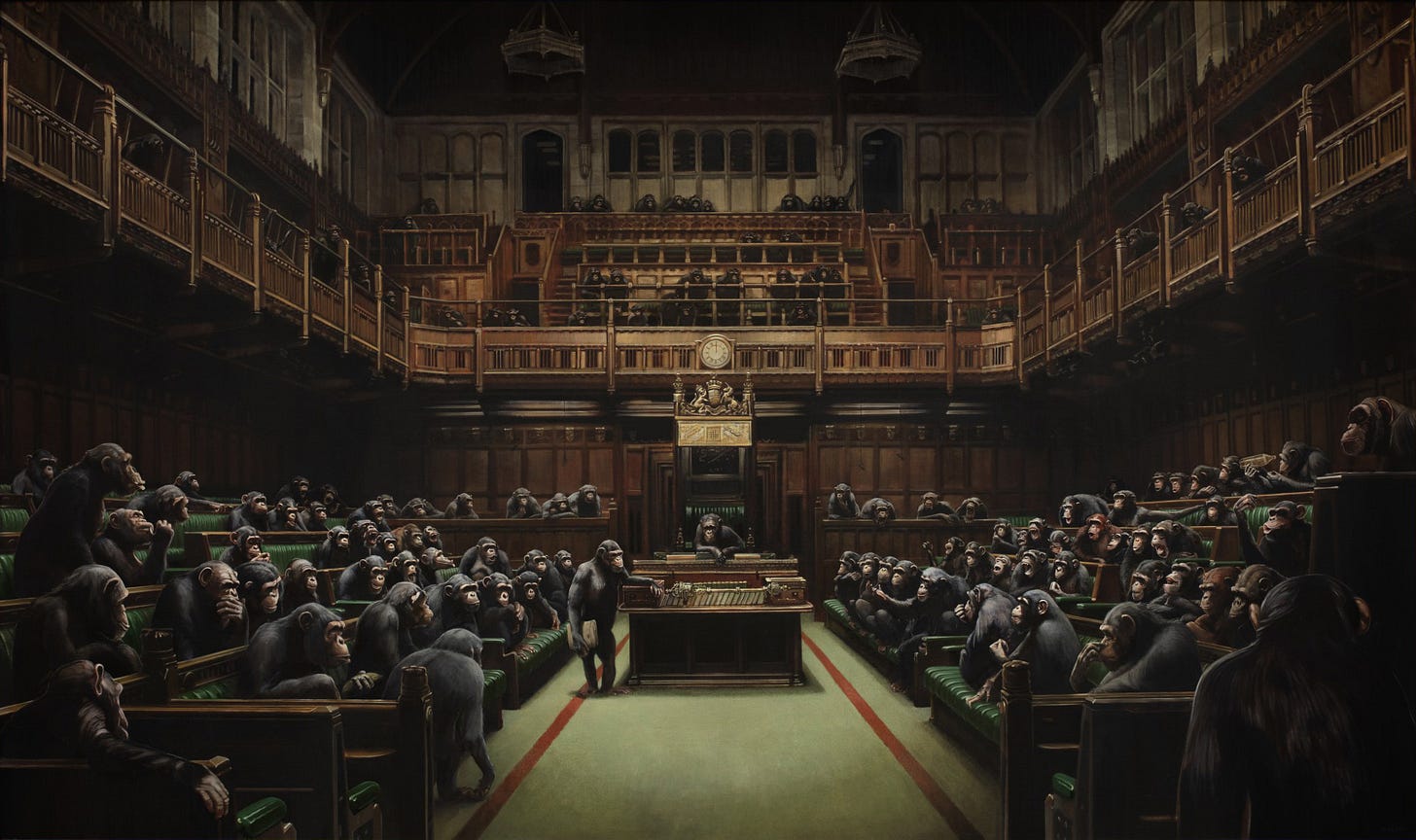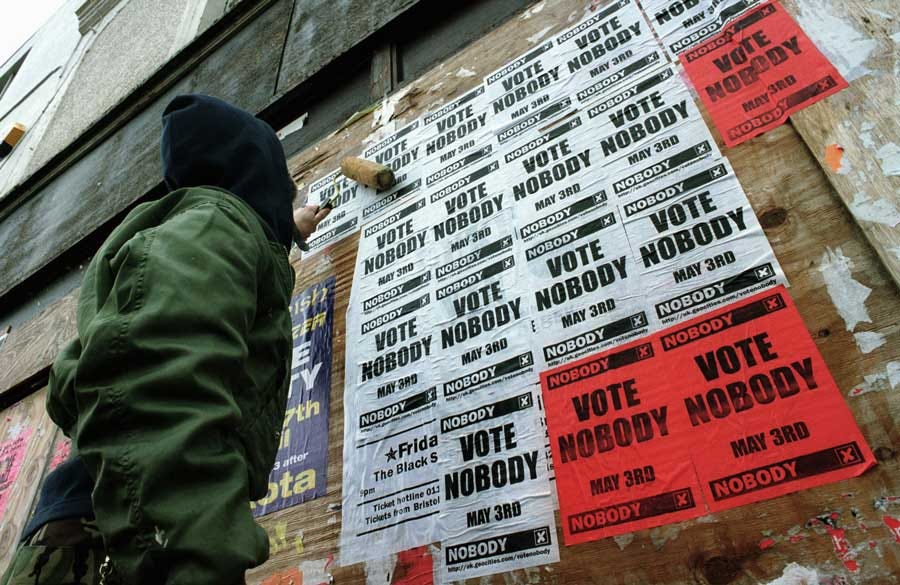Episode 16: Adam Richardson - Direct Democracy
A deep dive into the turbulent waters of UK politics with activist and blogger Adam Richardson of Direct Democracy
Direct Democracy are a new platform party standing in the next UK election. They plan to offer British voters a new model for political engagement - one that harks back to the earliest forms of Greek democracy. We speak to one of the party’s organisers and founders, Adam Richardson, about their plans, ideas and values.
A lot happened between the time we recorded this episode, and its release. To find out what Adam thinks about the Liz Truss “government”, the continuing fallout of Brexit and all the other most recent political bedlam in the UK, read our follow-up Q&A on the blog. Below, you’ll find a list of the books, thinkers and ideas Adam and I discussed.
Reading recommendations
Adam and I started off by discussing the number of arrests made during the official period of mourning for Queen Elizabeth II, and the wider implications of ongoing efforts by Britain’s ruling Conservative Party to curtail civil liberties, and the right to strike and protest. This is a sustained attack which precedes even the temporary amendments made to law and police procedure during the period of COVID lockdowns, as Kenan Malik writes, on the 2021 police, crime and sentencing bill, and its extension, the Public Order Bill, which was recently voted down by the House of Lords. This essay from Robert Skidelsky for Project Syndicate runs down some of the threats these bills pose to civil liberties and human rights.
The first book Adam mentions is ‘Democracy for Sale: Dark Money and Dirty Politics’ by OpenDemocracy editor Peter Geogheghan (here’s a review for The Guardian by John Naughton). It’s an exposé of the corruption and cronyism at the heart of establishment politics, and the crisis of confidence unfolding throughout democratic nations. Adam mentions the links between failed prime minister Liz Truss and Shell, which she highlighted in one of her own tweets. While this link doesn’t necessarily prove complicity it is emblematic of the cross-currents between big business and government (not just in the UK). It’s also true that Truss was against a windfall tax on energy companies. To say these two facts are not related seems wilfully myopic.
Adam formed Direct Democracy UK in 2019 to advocate for a different form of representative democracy, through regular referendums - this is what we discussed for much of Episode 16. Their site lays out their vision, values, and the aims of their political campaign. Elsewhere, The Constitution Society are a UK group similarly focused on constitutional reform. Their page on direct democracy does a great job of laying out the conceptual and historical architecture of this model of democracy, and some contemporary examples.
Given that Adam’s party presents itself on some level as ‘non-ideological’, and a refutation of the old, corrupted ideals found in modern democracies, I was keen to ask him about Slavoj Žižek’s notion of how ideology functions. His argument, in ‘Like A Thief in Broad Daylight’ and other books, is that ideology is at its densest where it presents itself as ‘non-ideological’:
“The key issue for the radical centre today is this: which of the two main parties, conservatives or liberals, will succeed in presenting itself as embodying the post-ideological non-politics as against the other party, which is dismissed as being ‘still caught up in old ideological spectres’?”
Adam responded by framing Žižek’s reading of ideology as a response to Francis Fukuyama’s ‘The End of History and The Last Man’, and the dissolution of Cold War political and military rivalries. I like Adam’s description of ‘ideology on a loop’ - that the major parties repeat themselves, and their old ideas, seems as self-evident in the neo-Thatcherite excesses of the Liz Truss mini-regime as it does in the blue rinse Blair-lite of Starmerism. He gives a quick shout out to Bungacast for their analysis of these ideas, and neoliberalism overall.
To understand how the current era of populism followed on from this, he recommends the work of sociologist Paolo Gerbaudo, who has written extensively about ‘platform parties’ including Spain’s Podemos, and Syriza in Greece. Gerbaudo’s book ‘The Great Recoil: Politics after Populism and the Pandemic’ is out now from Verso. Here’s a recent piece by Gerbaudo for Dissent Magazine on Italy’s far right resurgence, and another on coalition-building on the left from Bernie Sanders in the US, to France’s Jean-Luc Mélenchon.
We went on to talk about ‘flatpack democracy’ and the campaign by Independents for Frome led by Peter McFadyen. You can find out more about the approach taken by McFadyen and his group at the Flatpack Democracy site, and access their suite of tools for local groups to organise, campaign, and seek meaningful political power.
Our discussion led us briefly into a mention of Antonio Gramsci’s often-cited idea of ‘cultural hegemony’, and the difference between a ‘war of movement’ and a ‘war of position’. Gramsci remains a powerful influence on contemporary Marxist thinking. A brilliant essay by the great cultural theorist Stuart Hall from his collection ‘The Hard Road to Renewal’ (from Verso) outlines Gramsci’s significance, and the uses of his concepts and ideas at both ends of the political spectrum.
We also touch on some of the ideas around anti-intellectualism, declining faith in ‘experts’ and what that means for democracy. These are explored in great depth and nuance in William Davies’ excellent book ‘Nervous States: Democracy and the Decline of Reason’. I also briefly mentioned Jonathan Haidt and Greg Lukianoff’s idea of ‘common enemy’ vs. ‘common humanity’ identity politics, as outlined in ‘The Coddling of the American Mind’ (a book I might talk about more in a future episode). Adam touched on Aaron Bastani’s ‘Fully Automated Luxury Communism’, which if you haven’t read it, is a lot of (often very silly) fun.
I went on to compare this to the campaign for ‘Vote Nobody’ in Easton, Bristol in 2001.There’s not much to read about this takeover of the local council by anarchist campaigners beyond a contemporary piece in Squall Magazine, a short post on IndyMedia, and a Guardian piece from Felicity Carus.
I’d be very interested to speak to anyone with memories or knowledge of the campaign - it would make a great episode of Strange Exiles. I’m particularly interested in the parallels between the ‘Autonomous Zone of Free Easton’ the campaigners briefly established and the ideas in Hakim Bey's ‘T.A.Z.: The Temporary Autonomous Zone, Ontological Anarchy, Poetic Terrorism’. Got a lead? Email me!
There were a few more topics we touched on including Adam’s essay ‘The Guilty Parties’, but we’re running out of space here! If you enjoyed our chat, go listen to Adam’s brilliant interview with Adam Curtis over on his YouTube channel, and follow Direct Democracy UK on Twitter. Adam’s also on Substack now, so you can read more of his writing there.
Extra: On Afrofuturism, freedom, and the latest episode of Žižek-gate

Here are a few things I’ve been reading, watching and listening to since the last newsletter, with a few clues thrown in about the themes and topics of future episodes. I’m always interested to hear what you’ve been reading, or what you thought of the latest episode in the comments below.
2022’s Reith Lectures were themed around ‘four freedoms’ (find them via the BBC, who have both recordings and transcripts). Friend of the pod and Episode 10 guest Darren McGarvey’s lecture on ‘freedom from want’ is a direct challenge to our ideas about how inequality functions, and what that means for our concept of freedom. Chimamanda Ngozi Adiche meanwhile delivered an excoriating defence of free speech, following her controversial 2021 blog post attacking ‘cancel culture’ and social media.
The writing over at The Quietus remains top notch, whether on music or film. If you missed it in December, there was a great piece by Dylan Wray on the history of Warp Records’ seminal ‘Artificial Intelligence’ compilation.
One of the best recent tQ reads was an extract from a new book by DeForrest Brown Jr. about the political significance of Detroit techno label Underground Resistance. On a related note, Carnegie Hall recently posted five episodes of a podcast on the history and relevance of Afrofuturism featuring contributions from prominent thinkers, writers, artists and musicians. I’m listening through these after reading the brilliant book ‘Dead Precedents: How Hip-Hop Defines The Future’ by Roy Christopher, published by Repeater Books.
Roy Christopher’s book ties the gothic futurism of hip-hop orignator Rammellzee to the cyberpunk aesthetics of William Gibson, in part through interviews with contemporary Afrofuturist pioneers such as the UK’s Juice Aleem (who I also had the pleasure of interviewing in 2006 alongside his band New Flesh).
The ever-brilliant Kenan Malik has a new book out. ‘Not So Black and White: A History of Race from White Supremacy to Identity Politics’ sounds like an ambitious and wide-ranging expansion of the themes in his slim 2013 volume ‘Multiculturalism and its Discontents’. You can read an excerpt of the new one here. One of the sharpest critical thinkers on identity and culture, Malik published a couple of good pieces in The Observer in January, one on diversity and class, and a moving piece about his friend, the writer Hanif Kureishi.
Finally, our old friend Žižek had a piece in Jacobin in January proposing a new way of looking at time. This was his first essay in a while that avoided the use of ‘woke’ or ‘wokeism’ as a lazy shorthand for malfunctioning identity politics, which was a nice change of pace. Papa Z was in big trouble with both the tankies and the radical left of Twitter recently, following a high-profile hit-piece published by Gabriel Rockhill for Counterpunch. Draw your own conclusions from Rockhill’s very pro-Soviet line of argumentation.
For me, the best analysis of the article came from Doug Lain of Sublation Media, whose episode on the Counterpunch piece featured contributions from Ashley Frawley, Ben Burgis, and Theory Pleeb of the Theory Underground podcast. The ‘Young Žižekians’ of Theory Underground also leapt to Slavoj’s defence in a 3h episode featuring interventions from the hosts of Žižek & So On, Michael Downs of The Dangerous Maybe and others.
Next time on Strange Exiles: A glittering gala celebrity special
I’m a few weeks behind the curve with the newsletter from Episode 16. As I’ve said before, Strange Exiles is a one man band, and I lost quite a bit of January to illness (including losing my voice for the past week). This has hampered my ability to record, but I’m almost back on track. I have some brilliant guests lined up for the next few months.
Next episode, I’ll be flying solo again with an argument against celebrity-worship, conformity, and wellness cults. It’s a spiritual follow-up to my first solo show from season one, on the “recovery myths” of mental health discourse. I hope to bring you this one in the next couple of weeks, so stay tuned.
In other news, I fired up my old account weaponizer this month, and put together a microsite for some of my essays and interviews. I’ll be posting there about writing, ideas and culture from time to time, and sharing new essays when I publish them. See you over there in the Muskiverse I guess, for as long as that lasts.
Until next time, find Strange Exiles at the links below. Take care of each other.
Subscribe to the podcast at sptfy.com/strangeexiles
Follow @strangeexiles for updates
All subscribe links at anchor.fm/strangeexiles








